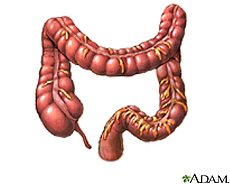National Institutes of Health
- The primary NIH organization for research on Ulcerative Colitis is the National Institute of Diabetes and Digestive and Kidney Diseases
 A service of the U.S. National Library of Medicine
A service of the U.S. National Library of Medicine  National Institutes of Health
National Institutes of Health
Ulcerative colitis is a disease that causes ulcers in the lining of the rectum and colon. It is one of a group of diseases called inflammatory bowel disease. Ulcers form where inflammation has killed the cells that usually line the colon.
Ulcerative colitis can happen at any age, but it usually starts between the ages of 15 and 30. It tends to run in families. The most common symptoms are pain in the abdomen and bloody diarrhea. Other symptoms may include anemia, severe tiredness, weight loss, loss of appetite, bleeding from the rectum, sores on the skin and joint pain. Children with the disease may have growth problems.
About half of people with ulcerative colitis have mild symptoms. Several types of drugs can help control ulcerative colitis. Some people have long periods of remission, when they are free of symptoms. In severe cases, doctors must remove the colon.
NIH: National Institute of Diabetes and Digestive and Kidney Diseases
References and abstracts from MEDLINE/PubMed (National Library of Medicine)
